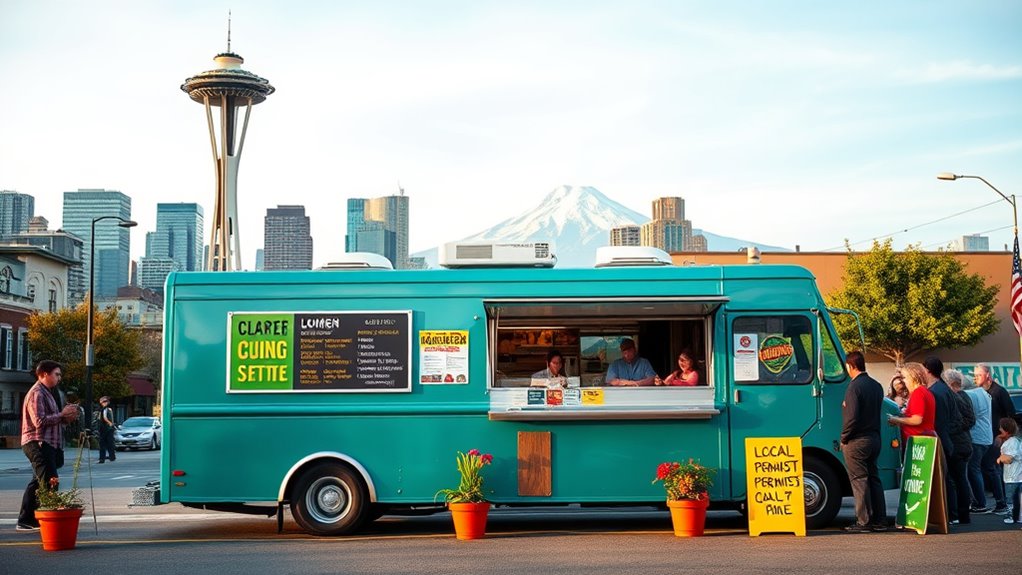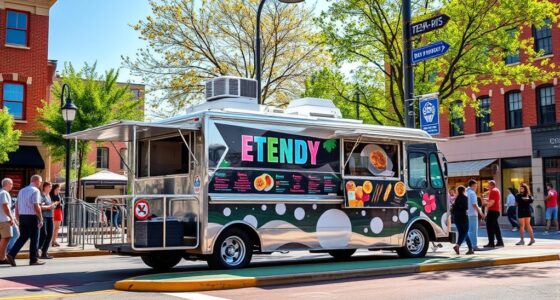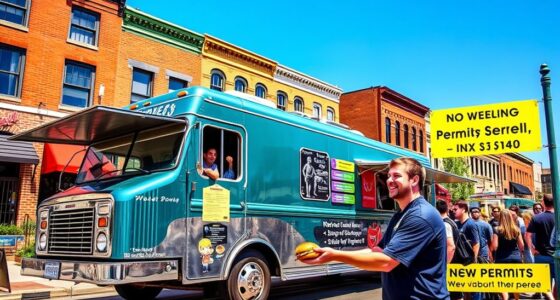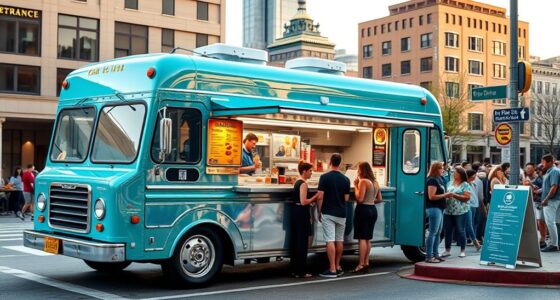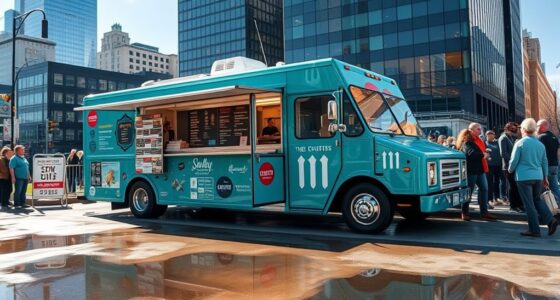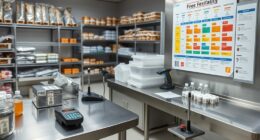To open a food truck in Seattle, you’ll need to secure permits from L&I and city agencies, which can take several weeks. Budget around $6,200 for permits, plus costs for your truck, branding, and supplies. Choose busy locations like Pike Place Market or festivals, and craft a menu that appeals to health-conscious and diverse tastes. For effective marketing, leverage social media, local events, and loyalty programs. Continue exploring these steps to successfully launch your food truck venture.
Key Takeaways
- Obtain necessary permits from L&I, City of Seattle, and King County, including vehicle plans, street use, and health permits, which can take 4-8 weeks.
- Budget approximately $6,200 for permits, with initial startup costs ranging from $81,500 to $175,000 for truck, equipment, branding, and supplies.
- Identify high-traffic locations like Pike Place Market and partner with breweries or events to maximize visibility and customer flow.
- Develop a menu with health-conscious, international, or gourmet options, emphasizing local sourcing and cultural storytelling.
- Use social media, community events, loyalty programs, and digital tools like GPS tracking to effectively market and promote your food truck.
Navigating Permit and Licensing Requirements in Seattle
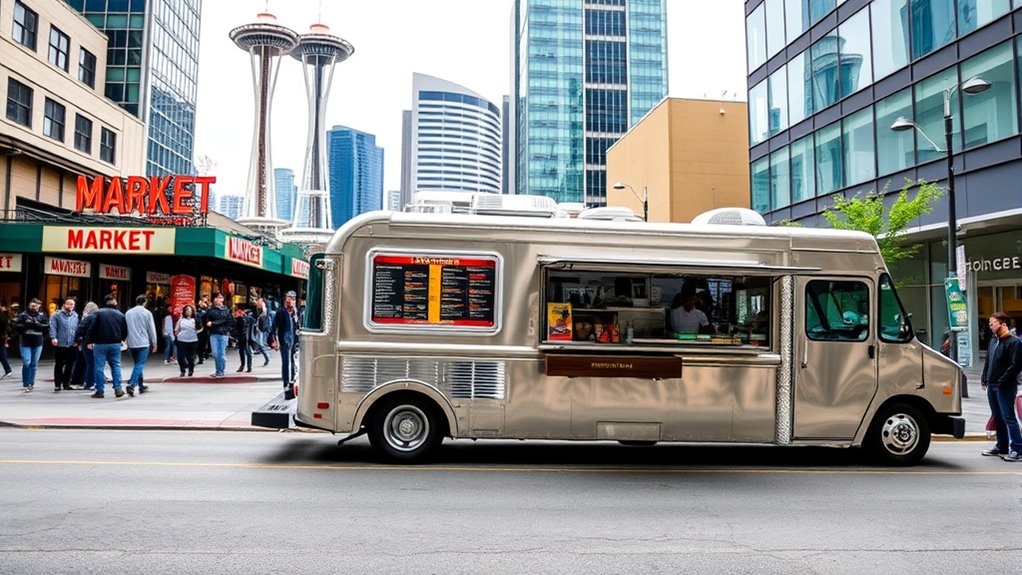
Understanding permit and licensing requirements in Seattle can seem complex, but understanding the key steps makes the process manageable. First, you’ll need L&I approval for your food truck or trailer, which requires submitting detailed vehicle plans. The approval process usually takes around eight weeks. You can find regulatory info in WAC 296-150V and contact the Factory Assembled Structures team at FAS1@lniwa.gov with questions. For your mobile food business, you’ll need to submit a plan review application, including forms for commissary use, restroom access, and contact info. This review might take 4-6 weeks. Additionally, you must obtain street use and public space permits via the Seattle Services Portal, specifying your vending locations and space needs. The portal allows you to specify vending locations and space requirements, and you can manage your application and track its progress online. Furthermore, King County health permits are mandatory, involving plan reviews and compliance with food safety standards. Ensuring compliance with local health regulations is essential for a successful operation.
Estimating Startup and Operational Expenses
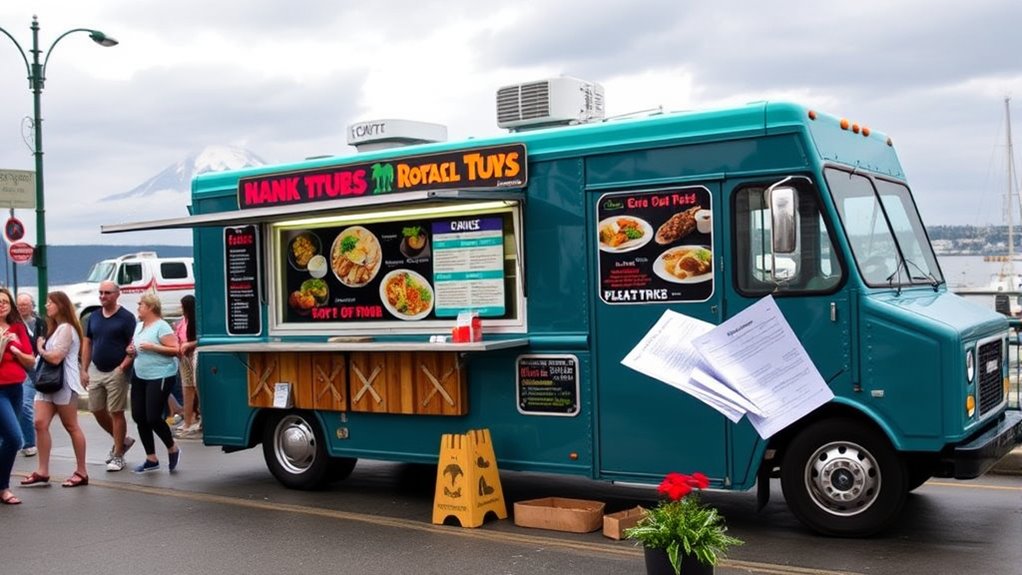
Estimating startup and operational expenses is essential for planning a successful food truck business in Seattle. Your initial costs include a truck, which can range from $75,000 to $150,000 depending on features and customization. Adding branding or wraps might cost an extra $2,500 to $5,000. Essential kitchen equipment, such as grills and refrigeration units, will likely cost between $2,000 and $10,000. Licensing and permits in Seattle are significant, with fees around $6,211, excluding administrative costs. You should also budget $2,000 to $3,300 for initial inventory and supplies. Additionally, incorporating sound healing science principles, such as calming music or sound therapy, into your truck’s ambiance could enhance customer experience and retention. Monthly expenses include fuel, maintenance, staffing, inventory restocking, marketing, and software, which can total from a few hundred to several thousand dollars. Proper estimation helps you plan for profitability and financial sustainability.
Choosing Prime Locations and Strategies for Food Truck Placement
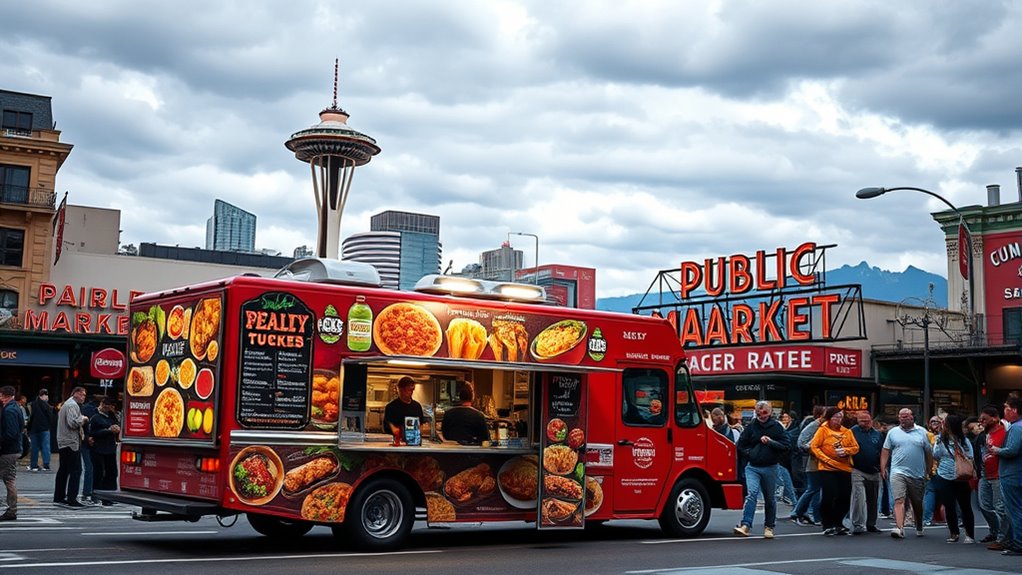
Choosing the right locations for your food truck can considerably impact your success in Seattle. Focus on high-traffic areas like office parks during lunch hours, bustling city centers such as Pioneer Square and Pike Place Market, and popular parks like Westlake and Occidental Park. Partnering with breweries and participating in festivals or community events can boost visibility and demand. Be mindful of zoning restrictions and guarantee compliance with Seattle’s permitting rules, health, safety, and environmental regulations. Analyze local demographics and monitor competitors’ locations and schedules to identify gaps and opportunities. Engaging with the community through social media and local partnerships also helps build a loyal customer base. Strategic placement combined with compliance maximizes your chances of thriving in Seattle’s vibrant food truck scene. Utilizing online platforms & registration can further support your location strategy by providing access to promotional opportunities and a network of vendors. Additionally, understanding how spiritual energy influences decision-making can help you cultivate a positive mindset and resilience amid challenges.
Crafting a Menu That Resonates With Local Tastes
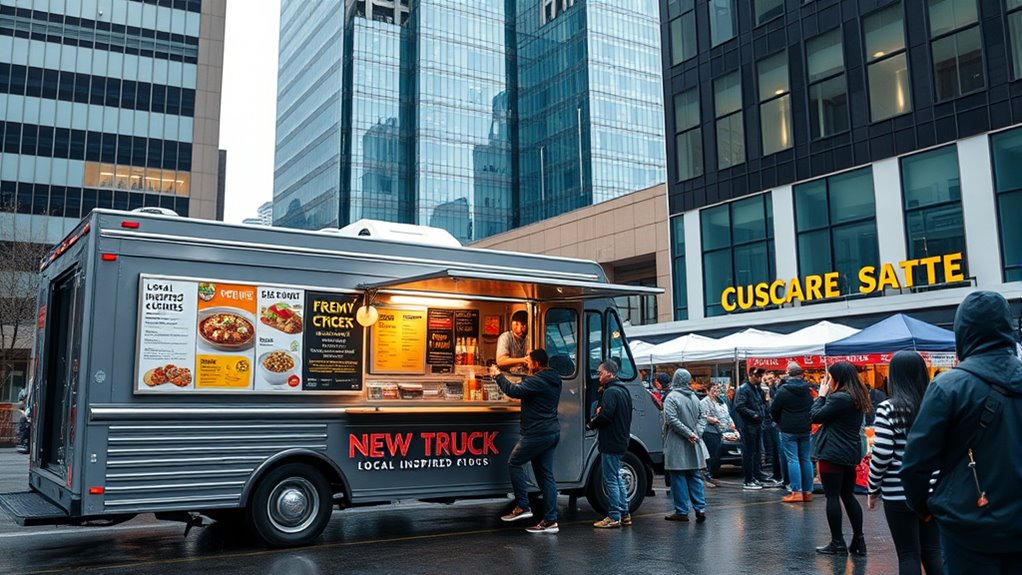
To succeed in Seattle’s competitive food truck scene, crafting a menu that aligns with local tastes is essential. Focus on incorporating plant-forward options, as health-conscious consumers seek high-protein, low-carb, and gluten-free choices. Embrace authentic international cuisines like Eastern European or African dishes, which are gaining popularity. Offer gourmet twists on American favorites, such as flavored jams or unique aiolis for burgers and hotdogs. Highlight seasonal offerings and rotating specials to keep your menu fresh and engaging. Emphasize sustainable practices, like sourcing from local farms and reducing ingredient waste, to resonate with environmentally aware customers. Incorporate versatility of hybrid bikes into your supply chain logistics, allowing for efficient transportation of ingredients and equipment across diverse terrains. Share the cultural stories behind your dishes to deepen connections. A well-curated, locally relevant menu will help your food truck stand out and attract loyal customers.
Effective Marketing and Promotion Tactics for Food Trucks
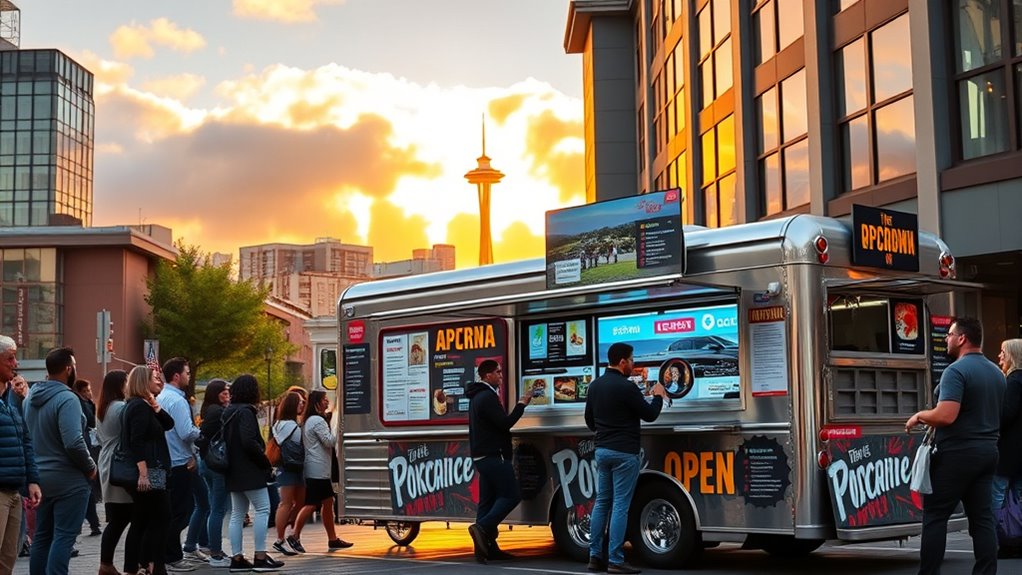
Effective marketing and promotion are essential for food trucks to stand out in Seattle’s competitive scene. Social media is a key tool; 68% of food truck owners use it for regular promotion, with Facebook being the most popular—75% actively engage there. These campaigns boost sales by around 20% and encourage customers to spend about 15% more. Targeting millennials, who make up nearly half of food truck diners, is crucial. Participating in festivals and community events increases visibility and revenue, helping you build a loyal local following. Digital tools like GPS tracking apps and AI ordering systems improve customer experience and operational efficiency. Additionally, loyalty programs and email marketing foster repeat business, ensuring sustained growth in Seattle’s vibrant food truck scene. Over 24,000 food trucks operate in the United States as of 2023, highlighting the competitive landscape and the importance of effective marketing strategies to stand out. Incorporating credit card processing solutions can also streamline transactions and enhance customer convenience, making your business more appealing to a wider audience.
Frequently Asked Questions
How Long Does the Permit Approval Process Typically Take in Seattle?
You want to know how long the permit approval process takes in Seattle. Typically, simple permits like temporary vending are approved in 5-10 days, but more complex ones, such as food trucks, can take 3-6 weeks. L&I approval might add another 8 weeks, and plan reviews can take up to 6 weeks. To accelerate things, submit complete applications early, follow up regularly, and guarantee all documentation is accurate.
Are There Specific Zoning Restrictions for Food Trucks Near Schools or Hospitals?
When it comes to zoning restrictions near schools or hospitals, the rules are evolving. You might find that restrictions near schools, like the 1,000-foot rule, are being relaxed, but it’s still a good idea to check the latest updates. For hospitals, specific regulations may apply, often requiring a review based on location. Keep your ear to the ground, as regulations can change, and you don’t want to be caught with your pants down.
What Are the Best Times of Day to Operate in High-Foot-Traffic Areas?
You should operate your food truck during peak times when foot traffic is highest. Typically, that means serving lunch from 11 am to 2 pm and early evenings from 5 pm to 7 pm. By targeting these hours, you’ll catch the lunch crowd and evening diners. Additionally, consider setting up during major events or weekends for even more exposure, but avoid slow periods like mid-afternoon when foot traffic drops.
How Can I Build a Loyal Customer Base in a Competitive Food Truck Scene?
Building loyalty in a crowded scene is like trying to stand out in a sea of neon signs—you need to shine brighter. Use digital rewards, exclusive deals, and referral perks to make customers feel special. Host events, offer seasonal promotions, and engage online. Partner with locals, gather feedback, and develop a unique brand. Basically, turn your customers into fans who keep coming back and bring friends along, every time.
What Insurance Coverage Is Legally Required for Food Truck Operation in Seattle?
You need to make certain your food truck has the legally required insurance coverage to operate in Seattle. This includes liability insurance with minimum limits of $25,000 per person and $50,000 per accident, plus $10,000 property damage. If you have employees, you must carry workers’ compensation. Additionally, some venues require proof of insurance, like a Certificate of Insurance, and you might need a health department bond.
Conclusion
Starting your food truck journey in Seattle is like planting a seed—with the right permits, costs, locations, menu, and marketing, you nurture it into a thriving tree. Each step is a branch reaching toward success, while your passion waters the roots. Stay adaptable and persistent, and soon, your truck will be a beacon in the city’s vibrant landscape—standing tall and lush, a symbol of your dedication and the delicious experiences you bring to the community.
